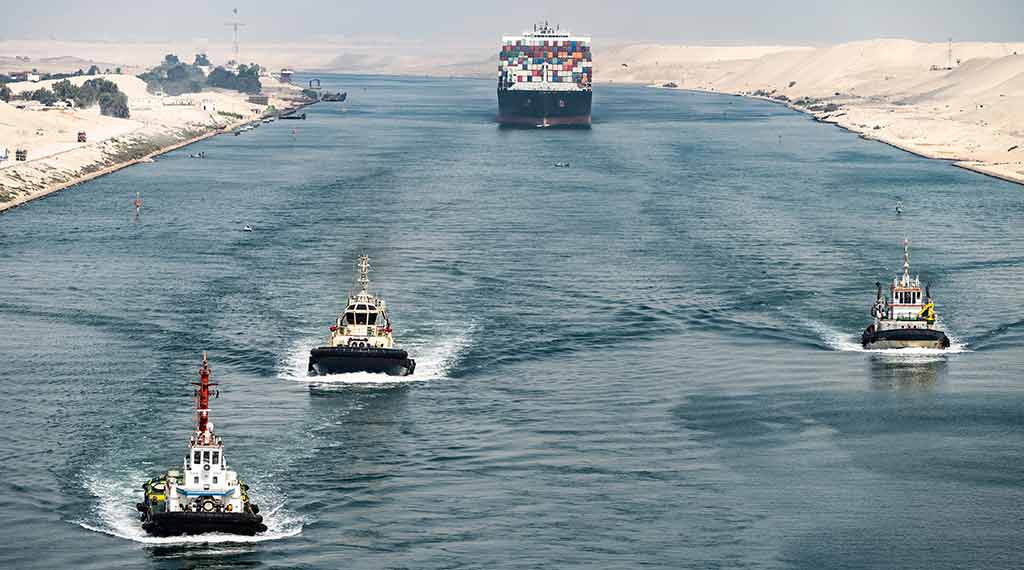
In the summer of 1956, the “Suez Crisis” began when Egyptian President Nassar nationalized the Suez Canal. By November England, France, and Israel invaded the Egyptian Sinai and Gaza Strip, effectively shutting down the canal and rendering useless to international shipping. During the ensuing negotiations between the United States and the Soviet Union it became apparent that the power and influence of the British pound and Great Britain had come to an end and was no longer a major player on the global stage. This period of history is known as the “Suez Moment” for the United Kingdom. It was an epochal event. Great Britain was no longer a great power. It could no longer act against the wishes of the U.S.
Today, the United States is facing its own Suez Moment because of attacks by Houthi rebels that have for all intents and purposes shut down the Suez Canal to international shipping.
Since November 19, dozens of commercial cargo ships have either been attacked or harassed by Houthi-rebels in or near the Bab al-Mandab Strait at the southern end of the Red Sea. As a result, American, French and British Navy ships have shot down Houthi-controlled drones and missiles attacking these commercial ships. These events are now disrupting the global supply chain. Hundreds of ships already having been diverted on the two-week longer journey south around the Cape of Good Hope and back up the west coast of Africa to reach European and American ports.
What is different about these new attacks is that they are being conducted as a proxy force backed by Iran of Houthi rebels who have been supplied with advanced anti-ship missiles, rockets, drone, and special forces.
Some 17,000 ships transit the Suez Canal per year. This represents 12% of the world’s trade and a $1 trillion worth of products, including 21% of all refined oil shipped from the Persian Gulf and Asia to Europe, North America, and North Africa. The cost from the Suez Canal’s de facto closure to much of the world’s shipping has already driven up shipping costs by 4% and the price of oil by 2% in the past week – threatening to disrupt the global supply chain.
To combat this threat, nearly a month later, on December 18, the U.S. the Secretary of Defense announced the establishment of “Operation Prosperity Guardian,” a coalition of nations’ navies under the umbrella of the pre-existing Combined Maritime Forces and leadership by Task Force 153. The mission of this new multinational security initiative is to provide escort for commercial shipping through the Red Sea and Suez Canal. At this point, Operation Prosperity Guardian could also be called “Operation Blackmail” given that Iran is now holding the global economy hostage as part of its agenda of destroying Israel.
Alarmingly, on Christmas Eve weekend the targeting of international shipping expanded to the Indian Ocean, when the Liberia-flagged, Japanese-owned, and Netherlands-operated chemical tanker, Chem Pluto, was struck by a drone from Iran some 200 nautical miles southwest of the Indian city of Veraval. To make matters even more dire, on the same day a senior Iranian Revolutionary Guard Corps member publicly threatened to shut down the Strait of Gibraltar and effectively close off the Mediterranean Sea.
As of Christmas Day, the threat to international shipping by Iran and its Houthi rebel proxies has placed the United States in the same position as Great Britain in 1956, a Suez Moment that will determine the future stature of the U.S. dollar and the power and influence of America as a world leader.
At this point it seems clear that instead of trying to play defense for the thousands of ships that transit the Suez and Red Sea, and other international waterways, it would make more sense to go after the origins of these attacks at the operational and strategic levels.
At the operational level, the U.S. military intelligence knows the location of Houthi camps and weapons caches along with Iranian drone and coastal anti-ship cruise missile batteries. Accordingly, instead of trying to protect each ship from the “arrows” of the Houthis, a more effective and less expensive strategy would be to go after the “archers” in Houthi camps in Yemen and the drone and ASCM batteries in Iran that are being used to attack international shipping.
At the strategic level, given Iran is the provider of funds to the Houthis, it is reasonable that the U.S. should resume the embargoes and tariffs that the Trump administration placed on Iran. This would suffocate their ability to fund Houthis, Hamas, and Hezbollah murderous actions. In addition to targeting Iran’s economy, the U.S. should also be targeting Chinese and Russians firms that are also supporting Iran. Suffocating Iran’s economy is less expensive, more effective and will benefit the entire world that is being blackmailed by these terrorists.
However, it appears that the Biden Administration is on the verge of failing at this critical moment in history. Specifically, there is a lack of maritime experience and leadership in the Biden administration that has diminished the number of nations willing to join the coalition.
- Victory over the PRC: Why engagement makes war with Beijing more likely - April 24, 2024
- The US must end engagement (and Biden’s neo-Engagement) with the PRC now - April 10, 2024
- How to address the CCP threat: Engagement, defeatism, or victory - April 3, 2024
